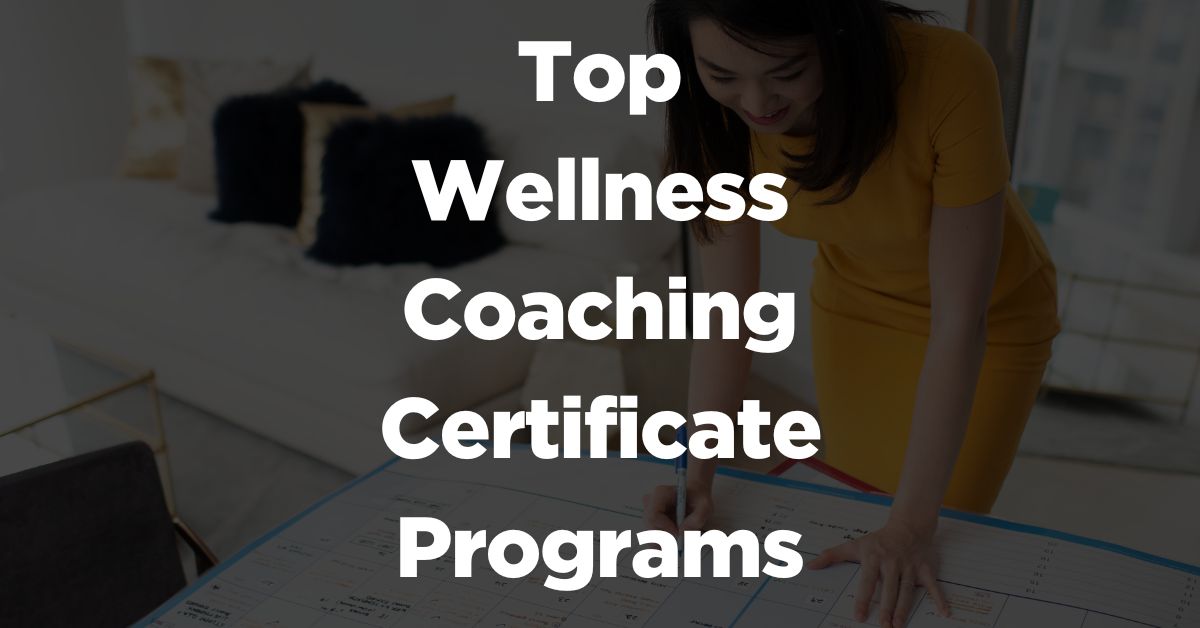Looking for the top wellness coaching certificates?
Let’s check out the best ones out there.
Plus, I’ll also teach you how you can become a six-figure wellness coach.
Ready?
Let’s get started!
You’ll learn:
The best wellness coaching certification programs
How to choose the right wellness coach certification program
How to become a six-figure wellness coach
What is a wellness coach?
Are you thinking of becoming a wellness coach?
Let’s get clear on what that means.
In simple terms, a wellness coach focuses on a client’s overall well-being. You help clients improve their whole life, for example to eat right, reduce stress, and improve their physical or mental health.
You help clients achieve their wellness goals by exploring how they feel, think, work, and live.
Get the Ultimate Guide
for building a
6-Figure Coaching Business so you can achieve more freedom!
This whole-body approach leads to powerful personal growth.
I’ll explain how you can become a six-figure wellness coach later in this article.
First, let’s look at the seven best wellness coaching certifications.
7 best wellness coaching certification programs
There are many wellness coaching certification programs out there. But which ones are the best?
Below, you’ll find the seven most useful courses.
Note: I didn’t go through these programs myself, but my recommendations are grounded in their reviews and reputation.
1. Mayo Clinic Wellness Coach Training Program
Mayo Clinic
The Mayo Clinic is a nonprofit medical center that focuses on integrated health care, education, and research.
Its Wellness Coach Training program has been accredited by the National Board for Health and Wellness Coaching (NBHWC).
Despite its short length of only twelve weeks, this program is very thorough.
It’s for people who’ve finished college and want to take on a specialized graduate-level course. This means that you need at least a bachelor’s degree to enroll.
You also need to be able to commit to weekly sessions.
The program includes:
- Interactive sessions
- Webinars
- Skill development
- Peer coaching
- Mentored coaching sessions
Once you’ve finished the course, you still need to complete 50 coaching hours to become a Mayo Clinic Certified Wellness Coach.
Duration: Three months
Price: $4,900
Pros:
- Taught 100% online
- Big focus on teaching you coaching skills
- Approved by the National Board for Health and Wellness Coaching (NBHWC)
Cons:
- You need a bachelor’s or associate’s degree to get in
- Not self-paced
- You need extra practice hours after the course to get certified
2. Certificate in Health & Wellness Coaching
Georgetown University
Georgetown University offers a hybrid Health & Wellness Coaching program. Hybrid means that it mixes in-person teaching with online study.
There are eight subjects that are taught over eight months.
The course delves into:
- How to look after clients’ whole health
- Wellness-oriented coaching strategies
- The psychology of behavior change in health contexts
- Understanding chronic diseases
- The business elements of running a coaching practice
The course is all about learning to help clients change their health habits.
The focus isn’t on health facts — it’s for those who already know their stuff and want to get better at helping others. This is also why you need a background in healthcare to enroll.
Duration: Eight months
Price: $8,500
Pros:
- In-person mentoring
- Practical coaching experience
- Broad topics that cover many different wellness niches (Can also be a downside)
- Approved by the National Board for Health and Wellness Coaching (NBHWC)
Cons:
- Need a healthcare degree or related work experience
- You have to attend all the classes
- Not self-paced
3. Health Coach Training Program
Institute for Integrative Nutrition (IIN)
The Institute for Integrative Nutrition (IIN) is a big organization that has taught over 100,000 students.
IIN believes that life stuff — like our career, money, social life, and environment — is just as key to our health as food.
They call these facets of life “primary foods.” And in their Health Coach Training Program, there’s a lot of focus on them.
You’ll also learn their IINtegrative Coaching Method. This is about practicing what you preach and using your own life to learn how to help clients change theirs.
The course is structured with weekly modules. If you’ve got 10-16 hours a week to spare, you can go for their accelerated six-month track. If not, you can choose their regular option which takes twelve months.
The program is available in both English and Spanish.
Duration: Six or twelve months
Price: $5,995
Pros:
- Available in English and Spanish
- A six-month fast-track option
- Focus on starting your own coaching business
Cons:
- Not self-paced
- The six-month track demands 10 to 16 hours of study per week
- The standard program takes a year
4. Health Coach Certification
Dr. Sears Wellness Institute
The Dr. Sears Wellness Institute’s Health Coach certification is good if you want to study at your own pace.
It lets you pick an area to focus on:
- Working with families
- Helping adults and seniors
- Coaching during pregnancy
You can take on extra specializations for a fee.
If you study for about nine hours each week, you can finish one specialty in six weeks. Choosing two specialties takes nine weeks, and studying all three takes 12 weeks.
The course mainly teaches about food, lifestyle, and exercise.
You need at least a high school diploma to sign up.
Duration: Flexible, but can be completed in as little as six weeks.
Price: $975 for one specialty
Pros:
- Self-paced
- Can be certified in six weeks
- Don’t need a bachelor’s degree to enroll
- Three certification options: families, pregnancy, adults, and seniors
- Approved by the National Board for Health and Wellness Coaching (NBHWC)
Cons:
- Some programs require weekly live virtual classes (Can also be a pro)
Get the Ultimate Guide
for building a
6-Figure Coaching Business so you can achieve more freedom! - Specialized certificates instead of broader wellness coaching (Can also be a pro)
- No feedback for coaching practice
5. Health and Wellness Coach Certification
The American Fitness Professionals and Associates
The program offered by the American Fitness Professionals and Associates is a good option for new coaches.
Their Health and Wellness Coach Certification is designed for beginners. This means you don’t need any previous health knowledge to start.
The course is split into two sections.
First, you get into holistic health and wellness. This covers everything from mental to physical to food-related health. You’ll also learn about substance abuse, alternative treatments, and how to stop health problems before they start.
The second section is coaching-focused. You’ll learn:
- Different coaching styles
- How to make coaching plans
- The business side of being a coach
The wellness coaching certification program has a good reputation and is backed by national boards, including the American Association of Drugless Practitioners (AADP).
It’s also more affordable than most of the other programs on this list.
Duration: Around six months
Price: $899
Pros:
- Self-paced
- Affordable price
- Open to everyone
- Prepares you to run your own coaching business
Cons:
- The topics are broad which makes it less ideal if you have a specific niche
- There are no live coaching feedback sessions
6. Health and Wellness Coaching Certificate
Emory University
Emory University’s Health and Wellness Coaching program is a rigorous course.
It’s for people who have already finished college so you need at least a bachelor’s degree to enroll.
The program is not as long as getting another degree but still gives you extra education and certification.
The curriculum includes both theory and practice. It’s hybrid and combines online classes with real coaching practice. There’s also a practicum of five mentored coaching sessions.
You have to attend all classes to graduate.
You’ll learn about:
- Holistic care
- Behavior change
- Health and lifestyle conditions
- Coaching psychology
- Positive psychology
- How to motivate clients
- The ethics of coaching
The program lasts 20 weeks, and you’re expected to put in around eight hours a week.
Duration: Four to five months
Price: $4,995
Pros:
- Comprehensive curriculum
- Hybrid program
- Academic certification
- Approved by the National Board for Health and Wellness Coaching (NBHWC)
Cons:
- Need a bachelor’s degree or higher to enroll
- Cannot miss any classes or coaching sessions
- Some in-person, full-weekend classes are mandatory
7. Health Coach Certification
American Council on Exercise (ACE)
The American Council on Exercise (ACE) is famous for its personal trainer certifications. But it also offers other specialty tracks.
Its Health Coach certification is one example.
This program is particularly useful for people who are already working as personal trainers.
However, you don’t have to be a certified trainer to enroll; you just need a background in health or fitness.
Besides health and wellness, the program covers important coaching topics like:
- Motivational interviewing
- Active listening
- Client-centered goal setting
The ACE Health Coach program is the only one accredited by the NCCA — the top standard-setters for health and fitness industry credentials.
The course is affordable and you get a thorough education without having to spend a lot.
Duration: Four months
Price: $850 to $1,495
Pros:
- Affordable
- Active community
- Big focus on growing your business
- Accredited by the National Commission for Certifying Agencies (NCAA)
Cons:
- Need NCCA-accredited certification, associate’s degree in a related field, or two years of specified experience to enroll
- Need to recertify every two years
- Need to pay extra to receive live coaching classes
These are the top seven wellness coaching certifications.
Next, we’ll go over how to pick the best one for you.
How do you choose a wellness coaching certification program?
Here’s what to pay attention to when picking a wellness certification program:
- Credibility: Look for a program that’s respected in the wellness community.
- Job prospects: Does the program offer help with jobs, like referral programs, setting up interviews, or connecting you with a professional network?
- Accreditation: Will you coach in the US or internationally? Some programs are more US-focused, while others are internationally recognized.
- Cost: What’s your budget? While more expensive doesn’t always mean better, too cheap might not offer much value.
- Coursework and practical experience: Theory is important but real coaching practice is invaluable. The best way to get better at coaching is by coaching.
- Flexibility: Busy? Find a program that lets you learn at your own speed.
- Post-certification support: The best programs help you build your business and network even after you’ve got your certificate.
A great certification program can offer you some benefits, but here’s the thing:
You don’t need a certification to become a six-figure wellness coach.
Neither coaching nor the certification industry is regulated. While there are some health coaching niches where the rules are stricter, this isn’t the case with most wellness coaching niches.
Instead, look at your results — that’s what your ideal clients care about. They hire you for the transformation you offer them, not the diplomas.
Want to know how to make these transformative results happen?
We’ll get into that in the next section.
How do you become a wellness coach?
Becoming a wellness coach isn’t too complicated.
There are six important steps:
- Finding your niche
- Creating your coaching offer
- Deciding if you want to get certified
- Getting your first paying clients
- Building your email list
- Scaling your business
Let’s break down what each step involves.
1. Choose your wellness coaching niche
First, figure out your special area in wellness coaching — your niche.
Because yes, even in a niche like ‘wellness’, you can get even more focused.
In fact, it’s one of the fastest ways to increase your income.
Let me explain:
Choosing a niche lets you become REALLY good at what you do.
Because you give advice that’s spot-on for what your clients need, they see faster results with less effort.
Happy clients recommend you to others. And when someone wants help with that specific topic, you’ll be the coach they think of.
That’s how you become a well-known expert in your field.
Niching down can be about focusing on a problem or topic, but you can also hone in on a target audience.
Here are some ideas:
- Outdoor wellness coach
- Stress management coach for new parents
- Sleep coach for children
- Corporate wellness coach
The key is to connect what you’re great at with what people need help with.
What are your strengths? And what are common challenges potential clients are facing?
If you haven’t found your niche yet, this quick video walks you through the process:
2. Create a wellness coaching offer
Next, it’s time to create your wellness coaching offer.
Here, I suggest you think ‘packages’, not hours.
Charging by the hour can shortchange you. Instead of seeing the bigger picture, clients focus on the worth of each coaching hour.
On the other hand, packages let clients invest in the outcomes they’re after.
And that is your true value as a coach. It’s about the results you help your clients get — not the hours you put in.
Plus, by shifting the focus to what clients will ACHIEVE by working with you, you increase the chances of them being willing to pay more.
Now, what should such a coaching package look like?
I recommend you start by offering three-month programs.
This could include calls every two weeks or once a month, plus extra help whenever they need it, all for a set price of $1,500.
Here’s why this format works so well:
Three months is enough time to see real changes.
The spaced-out calls give clients time to work on what you’ve talked about.
And the price is high enough for clients to be committed, but low enough to get clients fast.
Once you gain experience and become better at coaching, you can increase your rates. Many of my students charge $5,000 or more for their coaching packages.
That’s because the better you are at helping clients get results, the more valuable your coaching offer is.
I’ll explain how you can get your first paying clients in a bit. But before that, let’s look at if you should get certified or not.
Get the Ultimate Guide
for building a
6-Figure Coaching Business so you can achieve more freedom!
3. Get your wellness coaching certification
Are you thinking of getting certified as a wellness coach?
Here’s a quick overview of what you’d have to do:
- Choose a certification program that fits you
- Go through the steps to get certified
- Finish the program
- Get certified
Depending on the program, this can take a few weeks or several months.
Important to know: this step is COMPLETELY optional.
Some niches demand licenses and certifications. But this isn’t the case with wellness coaching.
That’s because as a wellness coach, you won’t be focusing on severe physical or mental health issues.
Instead, you help clients achieve the outcomes they’re after.
Now, while certifications are optional, the ability to get results for your clients isn’t.
This often comes from firsthand experience.
For instance, I didn’t have a certification when my coaching business took off. What I had was real-world know-how from 10+ years in the field, which let me help others grow their businesses. That’s how my coaching business hit the seven-figure mark in a year.
Real-life results always trump certificates.
And the time you invest in getting certified could instead be spent on finding your first paying client…
4. Get your first paying wellness coaching clients
Next, it’s time to start coaching.
For this, you’ll need a client. Yes, just one for now.
I always recommend my students to start with a single client. Focus on offering them a transformative experience before you look for more.
That’s how you avoid the biggest mistake new coaches make:
Setting unrealistic goals that only lead to disappointment.
It’s so tempting to dream of big earnings early on. But it’s a lot smarter to set smaller, more realistic goals.
Trust me, I once aimed for a big six-figure income before I’d even started. Now, I’ve hit those figures, but back then, it was too much, too soon, and it held me back from actually reaching my goal.
We want momentum instead of discouragement. That’s why you need to set achievable targets.
And guess what, getting ONE paying client is more than doable.
How?
Here are two great options:
- Reach out: Start with your community — friends or family members could be looking to improve their health and wellness. Or maybe they know someone else who is?
- Let them come to you: Be where your clients are. This could be Instagram, Reddit, or Facebook. Participate in groups related to wellness, offer your tips, and help with their questions. That way, potential clients see the benefits of your coaching firsthand.
As a new coach, you first need to build trust by offering great value.
Your first happy client will vouch for you and each new testimonial boosts your credibility. This makes it increasingly easier to attract new clients.
For more advice on getting your first client, check out this video I made for you:
5. Build your email list of potential wellness coaching clients
Getting clients quickly is important, but you also need to plan for the future.
Start with building an email list.
It lets you keep in touch with people who are already interested in your coaching offer.
They might not sign up for coaching right away, but with regular emails from you, you’ll be on their mind when they’re ready.
Like this, you’ll always have new potential clients coming in.
To build up your email list, try a combination of these two methods:
- Organic: Use social media and SEO-optimized blog posts to lead people to your sign-up page. You could give a sneak peek of your advice and invite potential clients to get more in-depth tips via email. You can also use a lead magnet, like a PDF or a webinar, to encourage sign-ups. This approach is a great way to build up an audience over time. But while it’s free, it does cost time and effort.
- Paid: Paid ads are a good complement to organic methods. They deliver quicker results and can get people to your sign-up page fast. But because they’re less personal they generally have lower trust and engagement than organic channels.
In this short video, I tell you exactly how to use email marketing to grow your business:
6. Scale your business
If you’re thinking, “Can I really make six figures as a wellness coach?”
I’m here to say YES, you definitely can.
Especially if you strategically scale your business.
Once you’ve built up a base of about 10 private clients, it’s time to think bigger.
This is where scaling comes into play. Scaling means you expand your business for more income without pouring in more time in the long run.
This is how you can scale your wellness coaching business:
- Group coaching: One-on-one sessions are great for improving your coaching skills. But once you’re comfortable, shift to group coaching. It’s a smart move because it lets you help many clients at once. This bumps up your income without stretching your schedule too thin. Begin with a smaller group for more personalized attention. Then work up to larger groups if you want to.
- Online courses: Over time, you’ll gather lots of useful advice. You can turn this knowledge into online courses. Online courses are the ultimate semi-passive income stream. Setting them up takes some effort, but after that, the more people sign up, the more you earn. Plus, your clients can learn whenever they want.
These scaling techniques increase your reach and income.
They also help you move toward the ultimate goal: a business that supports a life of freedom.
That’s the real beauty of being your own boss, and it’s totally within your reach.
Next steps
There you have it: everything you need to know about wellness coaching certifications.
Launching your wellness coaching business is all about the impact you have on your clients’ lives.
You can be a GREAT six-figure wellness coach, with or without a certification.
Want to put what you’ve just learned into practice?
Then get my blueprint for a six-figure coaching business today. It shows you exactly how to turn your skills into a thriving business.

Want to Build a 6-Figure Coaching Business So You Can Achieve More Freedom?
Get Instant Access To My FREE Ultimate Guide Below!
When you sign up, you’ll also receive regular updates on building a successful online business.
Read more:
The Best Coaching Certification Programs
How to Price Your Coaching Package








